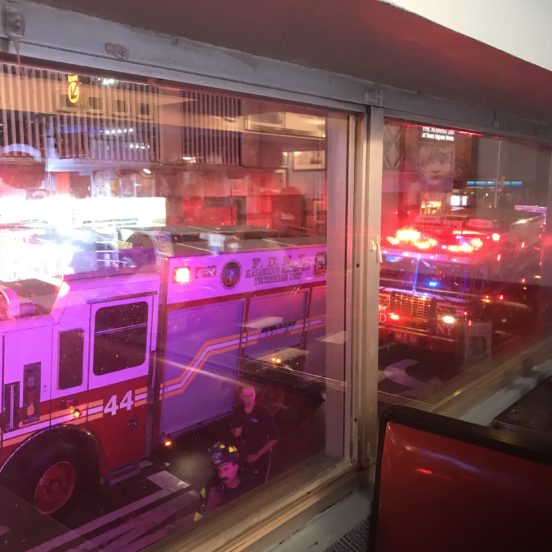Martha Pierce describes how a solidarity union handled a couple of urgent health and safety issues. Staff at this workplace are organized under the IWW.
The summer of 2018 wasn’t a smooth season for the workers of Stardust Diner. However, it showed a perfect example of how organizing among employees can force the boss to act and take responsibility for health and safety. Two major problems were the causes of such organizing: dysfunctional AC in the sweltering summer heat and gas leaks in the jazz club underneath the restaurant (owned by the same person), The Iridium.
Air Conditioning
For years every summer, the diner has been struggling with the same issue: the air conditioning not working properly as the temperatures rise outside. This year wasn’t an exception: the temperatures inside the diner easily reached 87-90F and in the kitchen they could easily be over 100F. Everyone was growing unhappy and concerned with the unsafe working conditions. After an emergency meeting was called between union members, a few servers approached the manager asking to close the restaurant should the temperatures exceed 85 degrees. The next day, same thing happened again: it was sweltering hot inside the diner. Servers refused to serve tables if the AC wasn’t fixed. As a compromise they agreed to move everything to the much cooler Iridium. Because managers didn’t agree to move downstairs, servers along with the kitchen staff walked off the floor. They agreed to start working again once the AC was working. At 11am the restaurant stopped seating new tables and didn’t seat again until 2pm when the temperatures inside seemed to cool off as some parts of the AC were fixed. This action, which brought together “front of house” (service staff) and “back of house” (kitchen staff) showed that solidarity and action can win. As a result, a new ventilation fan was installed in the kitchen and there is more work being completed in October.
Carbon monoxide gas leaks
During the month of August, some workers had started to suspect a gas leak in the restaurant, especially in The Iridium. They could smell something, and sometimes they experienced symptoms such as dizziness, nausea and headaches. This had been going on for a while. However, when any of the employees would raise the concern with a manager on duty, they would be waved off, saying it was all a product of their imagination.
On August 16th, an incident took place in The Iridium. 24 people (both customers and staff) were sickened and medically treated in a clear case of a gas leak. The issue was covered by local news channels and the fire department shut down the place for an evening. The next day, the general manager of Stardust Diner sent out a message update to all the employees. In it, he minimized the issue by calling it a “carbon dioxide leak” when it clearly was a carbon monoxide leak. He also warned that everyone was expected to show up for their shift since the diner was deemed safe for working. The Iridium, however, remained closed.
The Stardust Diner’s employees were not happy with vague messages from the management team and they put together a petition with 54 signatures demanding information about the leaks, ongoing safety checks, and a resolution to the problem. They walked out on the evening of August 28 and the morning of August 29, shutting the restaurant down. When the restaurant reopened on the afternoon of August 29, they marched on the boss and presented their petition. After this, the boss finally took the issue seriously. He sent out another message to all the employees where he acknowledged that it was indeed carbon monoxide and that they were installing new water boilers and new ductwork. He also implemented safety monitoring and the results were posted in a glass box for all workers to see.
A few weeks in, the employees report feeling safer at the workplace. The temporary boiler has been installed and all three floors now have active monoxide detectors. If they hadn’t organized an action to demand the information they needed to know, the boss would probably have continued disregarding the safety of the working environment. 24 people being treated in flashing ambulances with news cameras on the scene did not get the goods, but well-organized collective action did.

